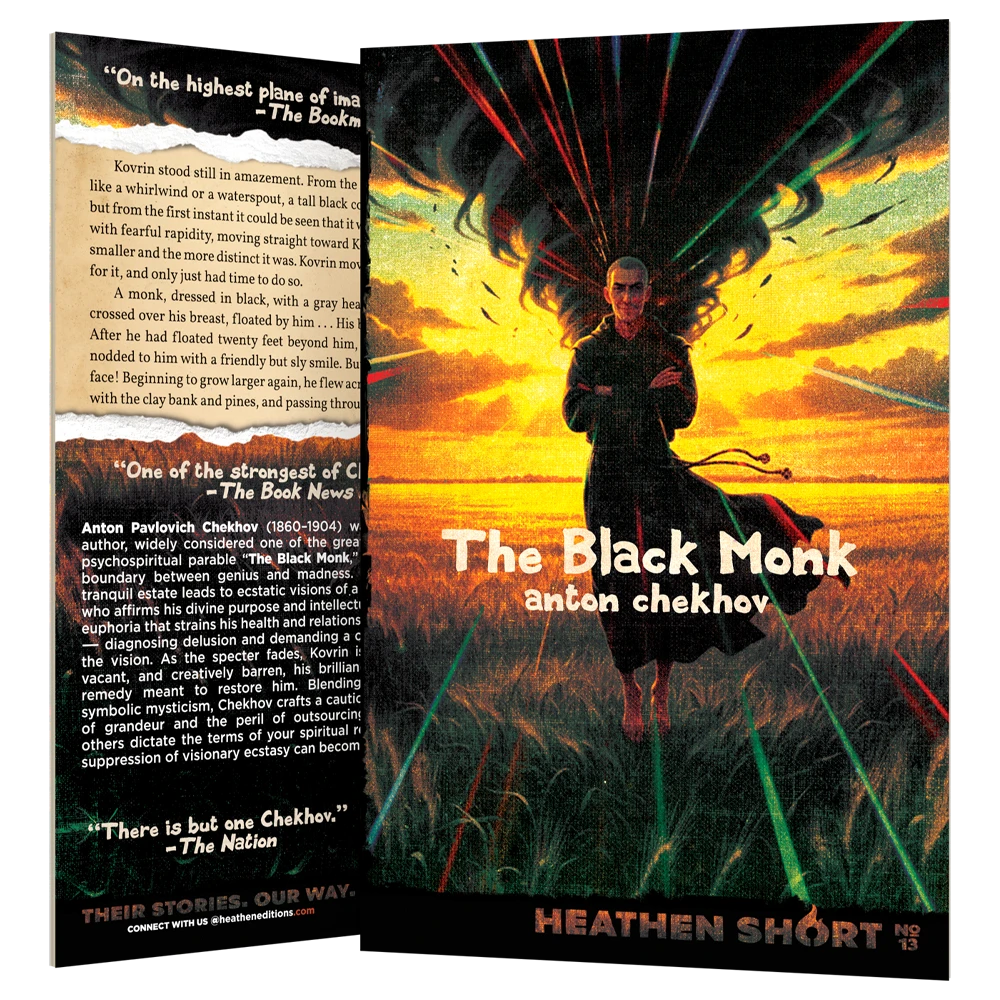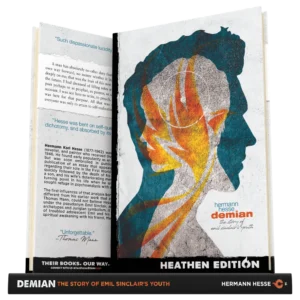No products in the cart.

The Black Monk
Heathen Short #13
Author
Anton Chekhov
Translator
Constance Garnett
First Edition
January 1894
Heathen Short
January 26, 2026
Refreshed
Pages
62
Heathen Genera
Existentialicious
ISBN
979-8-90075-013-2
Kovrin stood still in amazement. From the horizon there rose up to the sky, like a whirlwind or a waterspout, a tall black column. Its outline was indistinct, but from the first instant it could be seen that it was not standing still, but moving with fearful rapidity, moving straight toward Kovrin, and the nearer it came the smaller and the more distinct it was. Kovrin moved aside into the rye to make way for it, and only just had time to do so.
A monk, dressed in black, with a gray head and black eyebrows, his arms crossed over his breast, floated by him . . . His bare feet did not touch the earth. After he had floated twenty feet beyond him, he looked round at Kovrin, and nodded to him with a friendly but sly smile. But what a pale, fearfully pale, thin face! Beginning to grow larger again, he flew across the river, collided noiselessly with the clay bank and pines, and passing through them, vanished like smoke.
Anton Pavlovich Chekhov (1860–1904) was a Russian playwright and author, widely considered one of the greatest writers of all time. In his psychospiritual parable “The Black Monk,” Chekhov explores the fragile boundary between genius and madness. Andrey Kovrin’s retreat to a tranquil estate leads to ecstatic visions of a mysterious black-robed monk who affirms his divine purpose and intellectual superiority, fueling a manic euphoria that strains his health and relationships. When his wife intervenes — diagnosing delusion and demanding a cure — the treatment silences the vision. As the specter fades, Kovrin is left disillusioned, spiritually vacant, and creatively barren, his brilliance extinguished by the very remedy meant to restore him. Blending psychological realism with symbolic mysticism, Chekhov crafts a cautionary tale about the seduction of grandeur and the peril of outsourcing one’s sanity — of letting others dictate the terms of your spiritual reality — and reveals how the suppression of visionary ecstasy can become its own quiet death.
Test Your Might
Available on backorder
OTHER RETAILERS
Rate & Shelve It
"On the highest plane of imaginative invention."
George Sampson
The Bookman
Heathenry
Contents
Praise
Details
Heathenry
This has become one of our favorite short stories, if for no other reason than we feel the TL;DR takeaway is: “Do not allow anyone to define your crazy, for therein lies ruin.”
As for the text, we have utilized the 1917 English translation by Constance Garnett as published in The Tales of Chekhov, Volume 3: The Lady with the Dog and Other Stories. We’ve updated a handful of outdated hyphenated words so they read a bit easier on modern eyes: to-day is now today, to-morrow has become tomorrow, and so on. Likewise with words that were once two but are now one: for ever is now forever, any one is now anyone, and so forth. The true bulk of our work, though, lies in the 80+ footnotes we’ve appended throughout the story for clarity, context, and commentary where necessary.
Finally, we leave you to the story itself — this story whose title has summoned you. Walk with Kovrin awhile, explore the garden, allow your Monk to manifest . . . and what you make of it all, well, remember: all the necessary information is in the text.
Contents
Heathenry: Thoughts on the Text
“The Black Monk“
“The Black Monk“
Praise
“This is one of the strongest of Chekhov’s stories.” —The Book News Monthly
“‘The Black Monk,’ a most remarkable story, compasses the tragedy of a brilliant intellect gradually collapsing into madness and wrecking other lives in its downfall. The story is on the highest plane of imaginative invention, and is told with a wealth of detail and description; yet it is less than fifty pages long.” —George Sampson, The Bookman
“And here the last fragment of hope is gone; dumb despair stares us in the face, and the characters, not being fighters, surrender . . . nobody can be compared to him in his own realm; there is but one Chekhov, just as there is but one Dostoevsky and one Tolstoy.” —Nathan Asch, The Nation
“Imagination and inspiration, whatever their source, are necessary to lift man to his rightful place above the rest of created things. This seems to be the purport of the story. No one reads the gray tales of Chekhov to be amused. Amazement is what the reader gathers out of them—amazement at Chekhov’s awareness of what unexpected things the mind is doing under sets of commonplace circumstances.” —The Evening Star
“One of Chekhov’s powerful delineations of an artistic nature.” —The Morning Union
“Chekhov shows us how the instinct for comfort, physical and mental, is the root of commonplaceness, the mainspring of the bourgeois. As soon as man gives way to it he finds the world, outside its immediate relation to himself, uninteresting, and becomes in his turn uninteresting, except to the part of the world which makes its profit out of him. Whether Chekhov did it with premeditation or not, no one has analyzed more acutely than he the psychology of the bore.” —The New York Times Book Review
Details
The Black Monk
Heathen Short #13Published: January 26, 2026
Format: Paperback
Retail: $7.95
ISBN-13: 9798900750132
Dimensions: 8.5 x 5.5 x 0.15 inches
Weight: 3 oz
Cover: Matte Finish
Interior: Black & White on Cream Paper
Pages: 62(+2 POD)
Language: English
Annotations: 83 Footnotes
Illustrations: 3
- Title Page
- Heathenry Flame
- Honorary Heathen Headshot: Anton Chekhov
- Fiction / Visionary & Metaphysical
- Fiction / Psychological
- Fiction / World Literature / Russia
The Heathen Newsletter
Want to be kept in the loop about new Heathen Editions, receive discounts and random cat photos, and unwillingly partake in other tomfoolery? Subscribe to our newsletter! We promise we won’t harass you – much. Also, we require your first name so that we can personalize your emails. ❤️
@heatheneditions #heathenedition
Copyright © 2026 Heathen Creative, LLC. All rights reserved.




